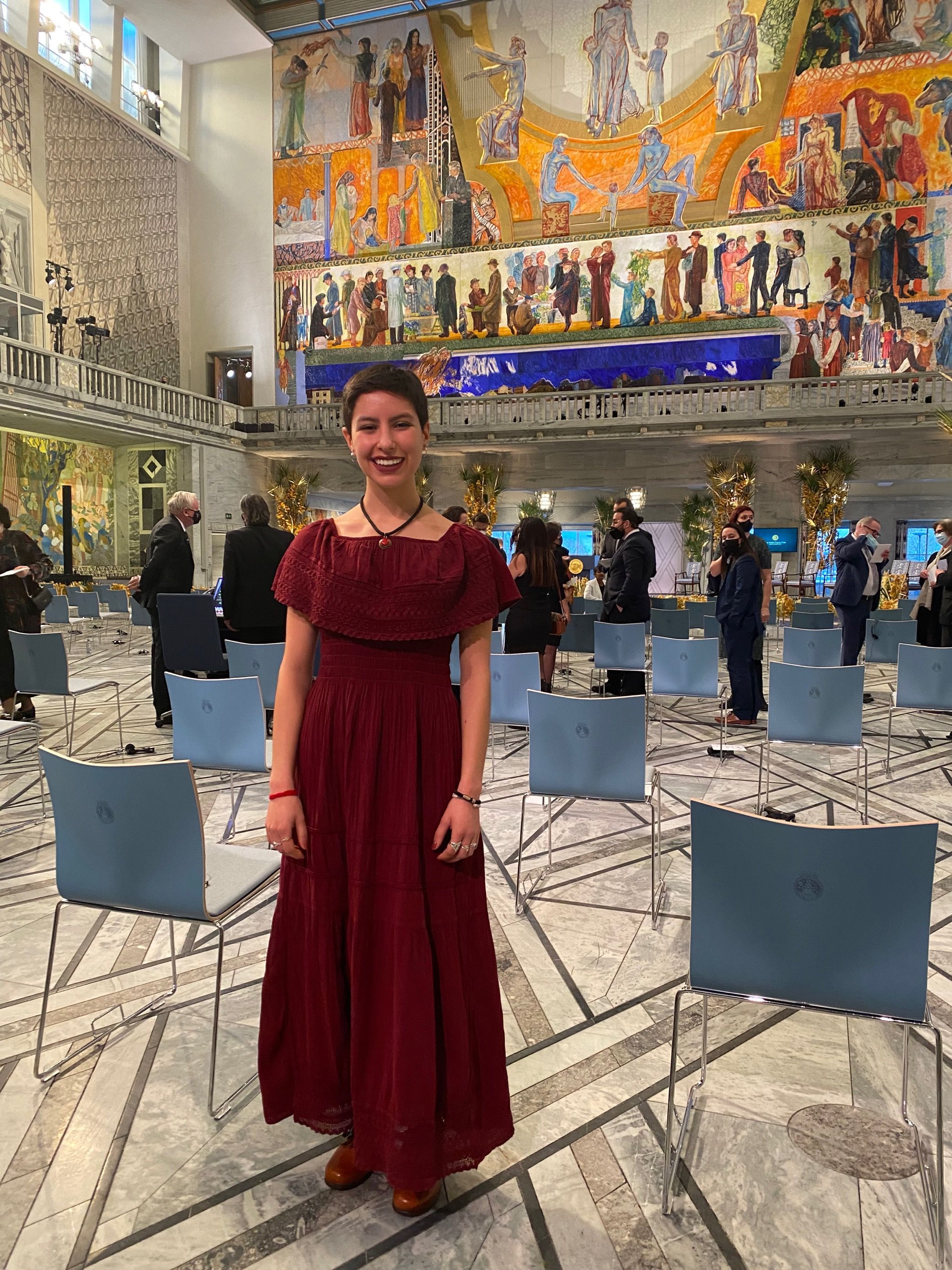Dear Generation Z:
I am part of ‘Gen Z’, a generation known for our organisation around climate change. Yet there is a larger challenge that many of our societies are facing that we don’t often talk about; which is the endangerment of our freedom of speech and the protection of journalists. This issue connects to a critical issue we care about: the state of our environment and the threats it faces, which journalists are often the ones to uncover, so if journalists don’t report on these with freedom, how will they become known?
As an undergraduate who cares deeply about this issue and part of the competition for the first-ever Ignitor Fellowship at the Nobel Peace Center, I was attending the Nobel Days in Oslo last week. This year, Maria Ressa and Dmitry Muratov, two journalists who courageously work to protect freedom of expression and democracy, were awarded the Nobel Peace Prize. The opportunity to be surrounded by such brilliant and brave people was surreal to me, and I am humbled and in awe of their accomplishments.
In 2016, the UNESCO reported a jarring global average: a journalist is killedevery five days for bringing information to the public. In this profession, people are assaulted and killed while they are doing a public service by trying to inform us. We live in an era where journalists are facing large amounts of violence and oppression: in nine out of 10 cases which UNESCOinvestigates of confirmed murders of journalists, theperpetrators remain unpunished. This impunity that enables the abuse against this sector of our society who are simply doing their jobs must be addressed.
From January to June of this year, there were 362 aggressions against journalists and media in my home country of Mexico. That is the equivalent to one journalist being assaulted every 12 hours. And throughout the world, this is even worse for women: 73% of women journalists have experienced online violence. Even writing about this topic as a university student, I sometimes worry that my words will be distorted; that I will put myself at risk by pointing out the ways we are failing journalists.
Through my research into anti-corruption I learned how journalists that investigate such problems continue to be at risk. According to the Mexican Institute for Competitiveness, most corruption crimes in Mexico aren’t punished. Journalism can be used as an anti-corruption mechanism, for instance by bringing cases of corruption to light. However, for this to be possible, whistle-blowers who inform journalists need to be protected, and journalists need to have the safety necessary to feel comfortable carrying out investigations and publishing them.
As someone who cares about this issue, I hope to see widespread and effective legislation and policy-making targeted at the protection of people’s freedom of speech and justice against those who threaten it. Our leaders and politicians need to enable the creation of settings where we as citizens are not tolerant of the instances of corruption reported in our countries. In 2017, a survey by the NGO Transparency International found that 51% of respondents have paid a bribe in order to access basic public services in Mexico. I hope to one day live in a country where corruption isn’t the norm.
The state of journalism in our respective societies is a reflection of our democratic systems. Democracies are characterised by equal and effective opportunities to learn about alternatives and consequences of political decisions. A free press becomes a symbol of democracy when it can provide the necessary information for citizens to engage in debate and form opinions.
In societies where we are plagued by an oppressive system and networks of actors which enable the abuse of journalists, this can lead to self-censorship among citizens themselves and the inability to make informed decisions. The targeting of journalists not only represents a lack of freedom of speech to a degree that can end in death, but it is also an infringement of citizens’ right to information.
So, what do we do as young people who feel overwhelmed by the lack of protection for journalists? We must become aware of the situations that journalists face, and demand accountability from our leaders to uphold press freedom. We must, even if it’s painful, look within our own countries and what the situation is like for our journalists. We must start having conversations about the wrongs done to the people who are just searching for the truth. We should stay informed, and demand these rights to be respected because it is in our own favour to be aware and informed, to criticise, and to obtain the truth.
When I graduate in six months, I head into a world that disappoints me. The list ofglobal issues to work on seems to be infinite, and among us, Gen Z, I feel an increasing restlessness to take on the world and ‘fix it.’
There is much to be done, yet I still have hope. I think of my home, of my beautiful Mexico and the people in it, the warm and festive culture that I love, and I know that things can be better. Organisations like the Nobel Peace Center can show us that there is still hope, that as young people we can aspire to make big things happen, to feel empowered and able to raise our voices, to think, to talk, and to write. Your voice matters, and someone out there will listen, so open your eyes,think of what matters to you, and speak out. I’m ready to start a dialogue, are you?
This essay is a short version of the winner essay Natalia Sobrino-Saeb wrote for the essay competition launched by the Ignitor Fellowship Programme at the Nobel Peace Center. The fellowship works to honor youth who are committed to promoting democracy and dialogue.
Share:
